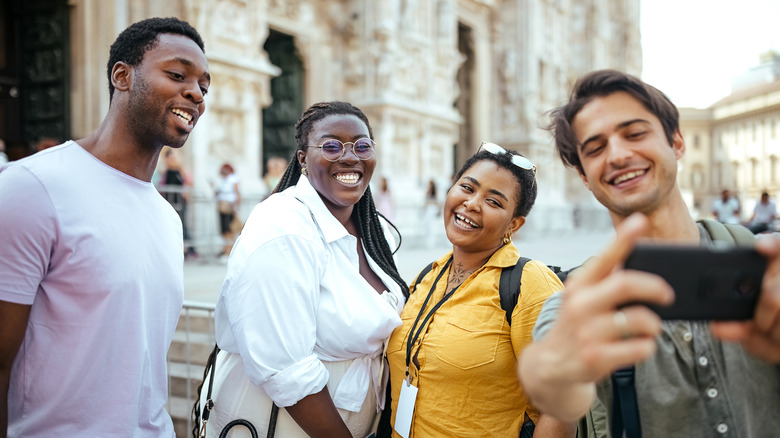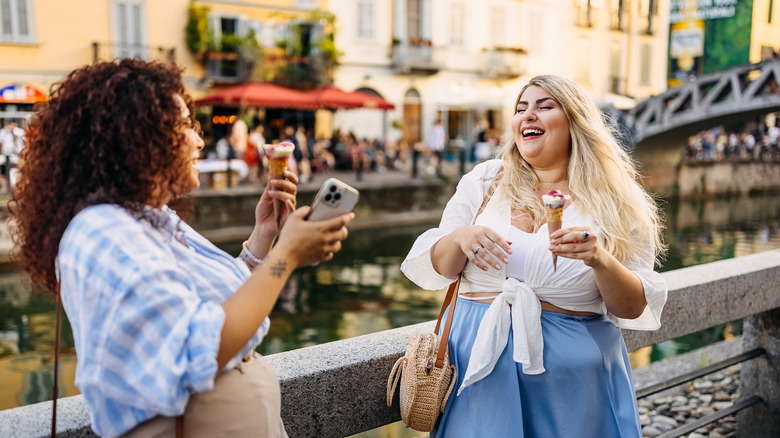Unspoken Etiquette Rules To Know Before Striking Up A Conversation With Locals In Italy
You've practiced your basic Italian phrases, and you're off to Italy! It's a wonderful thing to learn a bit of the language spoken at your vacation destination. However, language barriers aren't the only thing that can make being in another country feel, well, foreign. Sometimes, there are etiquette rules that you may not know about, or customs that are different from what you're used to in America. That's only to be expected.
Still, you're looking to bust common myths about Italy and see it all for yourself. You probably want to try out some of your newfound Italian skills and see if they hold up in conversation. Maybe you found someone who noticed you're American and wants to practice their English with you. Italians are often friendly, and it's easy to get caught up in the moment with your new friends or acquaintances.
When you do, you might accidentally use the wrong hand gesture or bring up a controversial topic. We've got some of the unspoken etiquette rules you should know before striking up a conversation in Italy with a stranger, and some more if that stranger becomes a friend and invites you over.
Italian etiquette for meeting new people
Italians are usually polite and friendly when meeting new people, and if you start a conversation, they'll likely join. Don't jump in with controversial topics, as that isn't really done with strangers. Avoid discussing politics and religion at all. Instead, begin with small talk about things like the weather and what you've seen in Italy so far. Complimentary comments are the way to go. Critique isn't comfortable for anyone, and you're a guest. Talking about things you've loved, asking for recommendations, or requesting tips to find the best restaurants in Italy are great ways to make friends. Criticism is saved for time in private.
Speaking of compliments, if you're given one, take it graciously and return the favor. Don't be concerned if you're interrupted while chatting. That's also common in Italy, as is (and you probably know this) gesticulation and animated facial expressions. If you really want to get the full meaning behind what someone is saying, watch their body language. Conversation in Italy isn't really about one person telling a long story with no breaks. It's about back and forth, with everyone participating. If it's not flowing smoothly, the Google Translate app can help keep your chat stress-free. Avoid rude gestures like flicking fingers in the air or doing so from under the chin, chopping motions with one hand, holding up a fist and hitting the bicep with the other hand, and "rock on" horns. They're all considered inappropriate and could start a disagreement.
Going beyond the first conversation
Your first conversation has gone well, and you're invited to visit someone's home. What do you need to know? First, bring a small gift like a bottle of wine or flowers, but don't wrap it in purple paper as that's considered bad luck. Regardless of gender, friends give a kiss on both cheeks when arriving and leaving. Young people are usually less formal, but note that, if elders enter the room, it's courteous to stand up. If you don't know them yet, refer to them as "Signore" (masculine — pronounced "sin-your-ay") or "Signora" (feminine — "sin-your-uh"). Unlike some other countries, it's considered rude in Italy to take off your shoes unless requested. If you're offered a drink or a snack, it's customary to take it without demurring.
When you sit down for a meal, don't begin eating until the host says "buon appetito" ("bwon ap-eh-tee-toh") and let them serve the drinks. If you're sharing food, always pass to the left. It's bad form to put your elbows on the table or keep your hands in your lap. This should go without saying, but don't talk with your mouth full.
If someone is meeting you somewhere, don't be put off by lateness. It's pretty common to be a bit tardy for gatherings (though not things like appointments with doctors or in business). Finally, don't point at people, and ask before you take a picture of someone. Smiling will also go a long way toward making new Italian friends.


